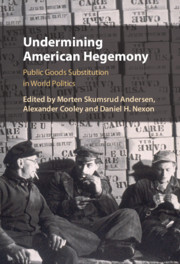Book contents
- Undermining American Hegemony
- Undermining American Hegemony
- Copyright page
- Contents
- Figures
- Contributors
- Preface
- Abbreviations
- 1 Goods Substitution and the Logics of International Order Transformation
- 2 Goods Substitution and Counter-Hegemonic Strategies
- 3 International Rankings As Normative Goods: Hegemony and the Quest for Social Status
- 4 China and the Asian Infrastructure Investment Bank: Undermining Hegemony through Goods Substitution?
- 5 The Silk Road to Goods Substitution: Central Asia and the Rise of New Post-Western International Orders
- 6 Goods Substitution in the USA’s Back Yard: Colombia’s Diversification Strategies under Conditions of Hierarchy
- 7 Goods Substitution at High Latitude: Undermining Hegemony from below in the North Atlantic
- 8 Reflections on the Volume
- Bibliography
- Index
2 - Goods Substitution and Counter-Hegemonic Strategies
Published online by Cambridge University Press: 21 July 2021
- Undermining American Hegemony
- Undermining American Hegemony
- Copyright page
- Contents
- Figures
- Contributors
- Preface
- Abbreviations
- 1 Goods Substitution and the Logics of International Order Transformation
- 2 Goods Substitution and Counter-Hegemonic Strategies
- 3 International Rankings As Normative Goods: Hegemony and the Quest for Social Status
- 4 China and the Asian Infrastructure Investment Bank: Undermining Hegemony through Goods Substitution?
- 5 The Silk Road to Goods Substitution: Central Asia and the Rise of New Post-Western International Orders
- 6 Goods Substitution in the USA’s Back Yard: Colombia’s Diversification Strategies under Conditions of Hierarchy
- 7 Goods Substitution at High Latitude: Undermining Hegemony from below in the North Atlantic
- 8 Reflections on the Volume
- Bibliography
- Index
Summary
In this chapter, Cooley and Nexon argue that instead of operating with a continuum from “revisionist” to “status quo” powers, we should rather focus on the broader strategic environment in which power political maneuvers take place. This is an international goods ecology, comprising types of goods and their distribution. The key advantage of studying power politics as operating within such an asset ecology is how order itself then becomes something different from polarity or hegemony. This makes it possible to distinguish between challenges to the power position of the hegemon and challenges to the architecture of the international order itself. Cooley and Nexon therefore develop an alternate typology of how international orders are challenged to show how acts of substitution are themselves potentially order transforming. They argue that US-led hegemonic order may be undermined before any overt challenge to the power position of the United States emerges. The main benefit of studying the logic of asset substitution is that it gives us a tool to assess how seemingly unimportant acts of substitution, bit by bit and regardless of a lack of revisionist intent, can shape and transform the international order.
Keywords
- Type
- Chapter
- Information
- Undermining American HegemonyGoods Substitution in World Politics, pp. 29 - 61Publisher: Cambridge University PressPrint publication year: 2021

